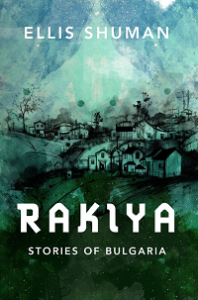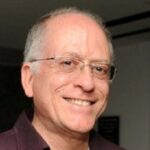Short story writer Ellis Shuman joins me today to chat about Rakiya – Stories of Bulgaria.

Bio:
Ellis Shuman is an American-born Israeli author, travel writer, and book reviewer. His writing has appeared in The Jerusalem Post, The Times of Israel, and The Huffington Post. His short fiction has been nominated for the Pushcart Prize, and has appeared in Isele Magazine, Vagabond, The Write Launch, Esoterica, Jewish Literary Journal, San Antonio Review, and other literary publications. He is the author of The Virtual Kibbutz, Valley of Thracians, The Burgas Affair, and Rakiya – Stories of Bulgaria.
Welcome, Ellis. What do you enjoy most about writing short stories?
I have written two collections of short stories, and two suspense novels. While I enjoyed the process of writing novels, I found it more challenging, and more fulfilling to write stories. You need to tell a full story, including introducing characters and a plot that will keep the reader’s attention, in a limited number of words. In my book Rakiya I was able to present the uniqueness of Bulgaria—its stunning nature and rich history and culture—in several different approaches, something I couldn’t do in the two novels that also used Bulgaria as their setting.
Can you give us a little insight into a few of your short stories – perhaps some of your favorites?
I lived in Sofia, Bulgaria, for two years. In addition to exploring the country, I learned the story of how Bulgarian Jewry survived the Holocaust. At the start of World War Two there were 48,000 Jews living in Bulgaria, and despite Bulgaria being an ally of Nazi Germany, not a single Jew with Bulgarian citizenship was sent to the death camps. This is to the credit of the Bulgarian people, its clergymen, several brave politicians and more importantly the citizens of Bulgarian. That said, 11,343 Jews in Macedonia and Thrace, areas under Bulgarian control during the war, were sent to their deaths in Polish concentration camps.
I knew that when I began writing short stories set in Bulgaria, I wanted to include a story about this period in Bulgarian history. I am not a writer of historical fiction, so I approached this subject in a different way. The story is “Forgiveness”, the longest story in Rakiya. An Israeli man is invited to a small village in southern Bulgaria where a meets a Bulgarian veteran of World War Two who was charged with the mission of sending Macedonian Jews to the camps. In the story, the Israeli learns of the friendship the Bulgarian war veteran had with his grandfather, a relationship that changed during the war.
What genre are you inspired to write in the most? Why?
I think I will concentrate on writing short fiction. I am challenged to write flash fiction. I have yet to successfully tell stories in a very limited number of words.
What exciting story are you working on next?
This has yet to become clear to me, as for the immediate future I am looking for ways to promote my short story collection Rakiya. In a way, through my fiction I am introducing readers to Bulgaria, a self-appointed role that I enjoy. I have written many stories set in Israel, as well as others whose setting is not an element of the story, but I really enjoyed writing about Bulgaria. I’m not sure, yet, where my next exciting story will take me.
When did you first consider yourself a writer?
I have wanted to be a writer all my life. As a boy, I wrote and published a neighborhood newspaper. In school, creative writing was my favorite subject. As an adult I made several early attempts at writing novels, manuscripts that never saw the light as day. After living for short period in Bulgaria, I began writing travel reports, encouraging tourists to visit the country. And, I have always enjoyed writing book reviews.
How do you research markets for your work, perhaps as some advice for writers?
The majority of my stories did not require research at all, they were just expressions of my creative mind. However, preparation for writing “Forgiveness” required extensive research. I spent time in the libraries of Yad Vashem, Israel’s official memorial to the victims of the Holocaust. I read numerous books about that period of Bulgarian history. I interviewed Bulgarian journalists and historians, and I read the testimonies of Bulgarian Jews who lived during that period. And finally, I corresponded with many Bulgarians to check their knowledge of this remarkable story. Still, I cannot be sure that I accurately described the events that occurred. I did employ some artistic license for dramatic effect and any errors of how the history was portrayed in the narrative are my sole responsibility.
What would you say is your interesting writing quirk?
I am a very early morning writer. I take the first train to Tel Aviv, where my online marketing company is located, but before I report to my office, I sit down for an hour of writing at a nearby coffee shop. Over a cup of cappuccino, I ignore the noises around me and concentrated on my writing. My novels and short stories were all written in this matter. By the end of the day, I am too tired to be creative and my weekends are devoted to my family and to enjoying nature.

As a child, what did you want to be when you grew up?
As mentioned, I always wanted to be a writer. I have done many varied jobs during my life, including milking cows in a dairy farm, serving as Food and Beverage Controller in a Hilton hotel, and guiding youth on pilgrimages on Mt. Sinai, but I writing has always been in my mind, waiting for me to fulfill my goal of authoring books.
Anything additional you want to share with the readers?
I live in an amazing place. Israel has so much beauty, history, religion, and traditions, yet we just happen to live in the most dangerous neighborhood in the world. I was lucky to have had a two-year contract to live and work in Sofia, Bulgaria, which gave me a new outlook on life, and which served as inspiration for my writing. Two amazing countries. Israel is home, but Bulgaria will always be in my heart.
